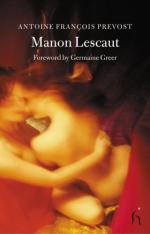“I tried to console Manon as we went along, but despair was rankling in my own heart. I should have destroyed myself a thousand times over, if I had not felt that I held in my arms all that could attach me to life: this reflection reconciled me. `I possess her at least,’ said I; `she loves me! she is mine! Vainly does Tiberge call this a mere phantom of happiness.’ I could, without feeling interest or emotion, see the whole world besides perish around me. Why? Because I have in it no object of affection beyond her.
“This sentiment was true; however, while I so lightly esteemed the good things of the world, I felt that there was no doing without some little portion of them, were it only to inspire a more thorough contempt for the remainder. Love is more powerful than wealth—more attractive than grandeur or fame; but, alas! it cannot exist without certain artificial aids; and there is nothing more humiliating to the feelings, of a sensitive lover, than to find himself, by want of means, reduced to the level of the most vulgar minds.
“It was eleven o’clock when we arrived at Chaillot. They received us at the inn as old acquaintances, and expressed no sort of surprise at seeing Manon in male attire, for it was the custom in Paris and the environs to adopt all disguises. I took care to have her served with as much attention as if I had been in prosperous circumstances. She was ignorant of my poverty, and I carefully kept her so, being resolved to return alone the following day to Paris, to seek some cure for this vexatious kind of malady.
“At supper she appeared pale and thin; I had not observed this at the Hospital, as the room in which I saw her was badly lighted. I asked her if the excessive paleness were not caused by the shock of witnessing her brother’s death? She assured me that, horrified as she naturally was at the event, her paleness was purely the effect of a three months’ absence from me. `You do love me then devotedly?’ I exclaimed.




